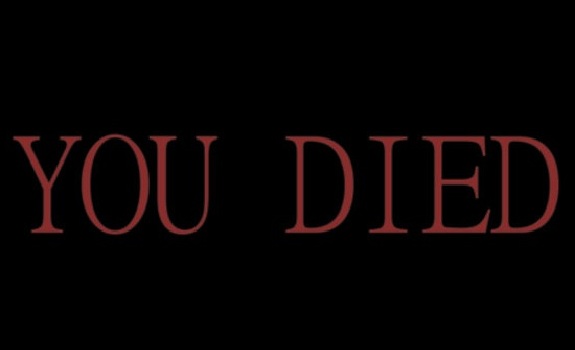Dying to Win - Death as a Gameplay Mechanic

If you’ve been playing games for any period of time, you’ve likely died a lot. You’ve thrown yourself against the video game meat grinder and come out the other side. There are games almost built around the idea of death as a crucial part of the game and players treat their completion like a badge of honor. Dark Souls: Prepare to Die, Rogue Legacy, and so many more take death and turn it from an inconvenience into a mechanic. But on the other side you have games like Super Meat Boy or Bioshock, which do their best to make death as little of an inconvenience as possible, and making it a fun part of the game.
How does this change the game that you play? In Bioshock, once you kill an enemy, it stays dead, no matter what. Even if you die, the people you kill are dead forever. You can use the vita chambers to slowly work your way through a level, killing off enemies in suicide rushes with your wrench, and basically making the challenge of the game trivial, besides the optional big daddy fight and the oft-criticized final boss. You never have to struggle with the game if you are patient enough and stop treating death as an obstacle.
Dark Souls is the exact opposite. Dying actively makes the game more difficult. You lose your ability to summon allies for assistance, and in some of the titles from the series, each death lowers the amount of health you have until you use a consumable that you can then run out of. It makes each subsequent run of a level more difficult, especially if it a level you are already having trouble with. All of the enemies will respawn if you rest to level up or heal and death is both a frustration and a hurdle for you to tackle. You have to learn enemy positions and pathing to the next checkpoint if you ever want to progress. In many ways the game is built around you dying to learn new areas and mechanics. It is a game of repeated trial and error, where the error is as much of the game as the trial.

Rogue Legacy is similar. You explore an ever changing castle looking for four bosses that you must defeat. As you fight you slowly gain money to upgrade your character and equipment so you can be stronger, faster, and better. You keep your money when you die, but only long enough to upgrade before you dive back into the castle. You die here to get better, to improve yourself, to reach that next upgrade. You know your death gives you a chance to improve yourself, to get better. There is still that element of trial and error, but as the castle is constantly changing, the game is less about memorizing enemy locations and more about improving your skills in order to be able to adapt to any situation that you come across.
Super Meat Boy takes a more traditionalist approach. If you die, you restart the level. Keep trying until you manage to finish. That’s it. They just made the act of death as painless as possible. As soon as your little meaty body explodes, you are ready to begin again. There is no lag, no waiting. It is perfect for a game where you can die hundreds of times in one level, where any amount of waiting between death and a second try would have ruined the game. And at the end of a level, watching your countless attempts is so gratifying that it is maybe the best part of completing a level.
If death is an inevitability, how should it be treated? The big choice here is how you make it part of your game. Super Meat Boy removes it from the equation. Yeah, you’ll die, but it doesn’t change anything if you do. It is perfect for a game based solely around the mechanics of play. There is nothing stopping you from trying again. But in a heavily story focused game like Bioshock, dying only serves to frustrate you and dilute the experience. By making death something that does not affect your progression through the level and allowing you to use your death to progress, they made it so theoretically anyone can finish the game and experience the story.
Dark Souls and Rogue Legacy embrace it as part of their level design. There are areas where you simply aren’t supposed to be if you haven’t played enough, and you are punished for trying to go there too early. It adds a further level to the game by building mechanics around your death that you have to work within. It adds a sense of tension to Dark Souls and a willingness to go on another run in Rogue Legacy. They teach you to not actively hate the moment of your death, but to instead grow from it.
One strategy is not inherently better than the other as long as the game is designed around the choice. Bioshock or Dark Souls could have worked with a traditional checkpoint system, but the harder fights would have felt like slogs instead of dynamic encounters. Super Meat Boy could have given you a life counter and turned itself into one of the hardest platforms on the market. Rogue Legacy could have been a traditional roguelike. Death is a part of a game, whether we like it or not. How we treat it can turn a normal game into something excellent.
_____________________________________________

Tom has been writing about media since he was a senior in high school. He likes long walks on the beach, dark liquor, and when characters reload guns in action movies.
You Might Also Like:
The Makings of a Good Horror Movie KillSchlock - A Torrid Love Affair
Death Doesn't Matter Anymore
_____________________________________________